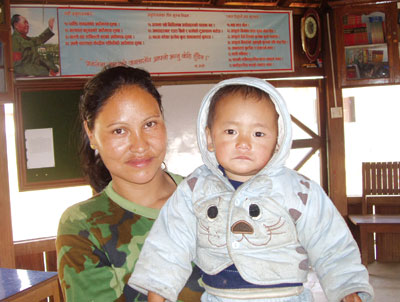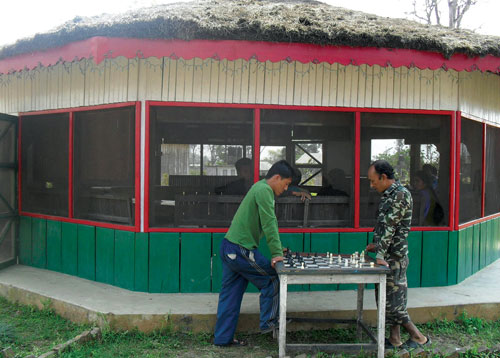 EKAL SILWAL |
"We can't understand why the political parties are fighting with each other in the name of the number to be integrated," says Janak Bahadur Bista (Kuber), the secretary of the Maoist cantonment in Shaktikhor, Chitwan. He suggests the politicians sit together to find a consensus. He is clear on how to proceed. "Open up the options, then individuals can choose freely as per their needs, interests and physical condition," Bista argues. "How can you prescribe without diagnosis?" He feels that the number of ex-combatants to be integrated into the national security forces depends on the other options that are available. "If a number in the thousands is fixed for integration and only 100 want integration, what happens then? Shall we fulfill the predetermined quota by opening new recruitment into the PLA?"
The other political parties are concerned that if the number isn't fixed beforehand, the majority of ex-combatants will want to join the security forces. Bista, who himself was seriously injured during the conflict (he still has an iron fragment in his mouth because of an explosion), waves this away firmly. "No, seventy-five per cent of us were physically wounded and many don't want to serve as security personnel." He adds, "There are also a number of mothers with four to five kids who dream of having a normal life outside of the armed forces."
According to Bista, integration and rehabilitation is secondary to the dignity of ex-combatants. "We fought to move this nation forward. If there is a political agreement that addresses our aspirations then we can leave the camps without a paisa. We're not goods to be sold." Bista takes issue with the term 'social rehabilitation' which implies, he says, that they are jungli (wild).
 EKAL SILWAL |
Surya Bahadur Khadka (Apil), an ex-combatant with a chronic physical disability, is also opposed to fixing the number of combatants for integration. Supported by his crutches, he insists that he should also have the right to join the Nepal Army. "Fixing the number to be integrated may prevent my joining the Nepal Army. That's unjust since there are many soldiers serving in the Nepal Army who were disabled during the war. I'm just like them. If I have to separated for rehabilitation, why not discharge them too?"
The issue of justice is clearly one that resonates with ex-combatants. Udaya Chaulaune (Dipak), the Vice Commander in Shaktikhor, says that a common agreement on a progressive political transition would sit well with the ex-combatants. For Chaulaune, this means a guarantee of a new constitution with powerful provisions for the rights of poor and marginalised people. "Our fight ends when the losers of the current system can get something from the upper classes, who oppressed them so much in the past," he says.
It's not surprising that many in Shaktikhor express political views similar to those of the Maoist leaders currently negotiating their futures. Shanta Pokhrel (Aruna) is the Health Battalion in-charge and feels her future is attached to that of all the oppressed people in the country. She says, "I'm not worried at all for myself as we want gender and class liberty first. So there won't be any blocks once we get rid of the political deadlock." Aruna and her husband, Jyoti Adhikari, are waiting along with their five-year-old son Ujwal for such a political settlement. But she is offended that there have been "excessive exercises to break the unity of the PLA", which she terms "unacceptable".
But as they wait for the deadlock to end, it's clear patience is at a premium. Bista concedes that the ex-combatants didn't expect to stay in the camp for years, with an uncertain future ahead of them. "We thought we'd be here until the Constituent Assembly elections," he says. "Some people must be just waiting for us to get tired and depressed." Camp scenes confirm his assertion that it's "boring". At noon on Monday, ex-combatants kept themselves busy with carrom, chess, ludo, volleyball, football, TV, radio, and simply sitting under trees, taking turns to patrol every two hours. According to official PLA records, Shaktikhor and its three satellite camps are shelter to 3935 ex-combatants.
However, anticipation is still alive in the young ex-combatants. Numakanta Acharya (Binod), who as health department chief runs the hospital inside the cantonment, says they are waiting for consensus, but that they are willing to be flexible if their guardian party, the UCPN-Maoist, reaches an agreement. Toeing the party line is probably what is keeping the ex-combatants cool in the summer heat of Chitwan, or their mounting impatience may have boiled over a long time ago.
READ ALSO:Running on empty
The Buddha's message, Publisher's note
Don't kill the CA, Gagan Thapa
The PLA speaks, Ekal Silwal
Flagellating the self-flagellators, Rabi Thapa
Online incline, CK Lal


